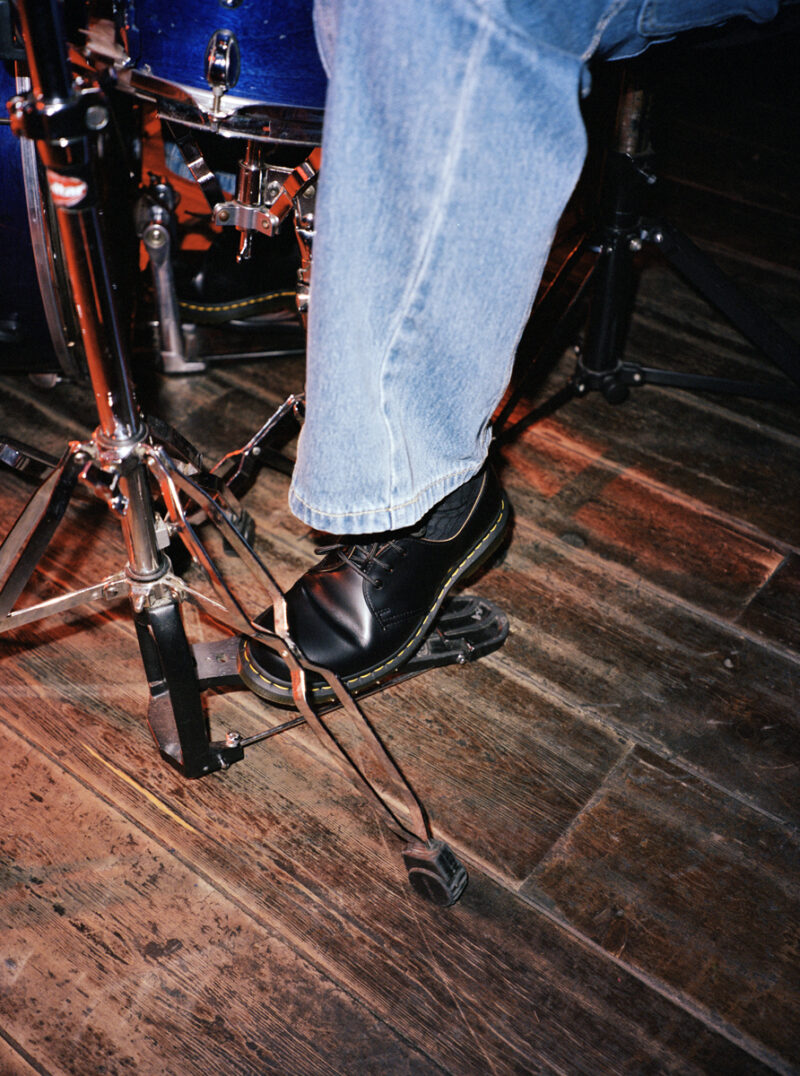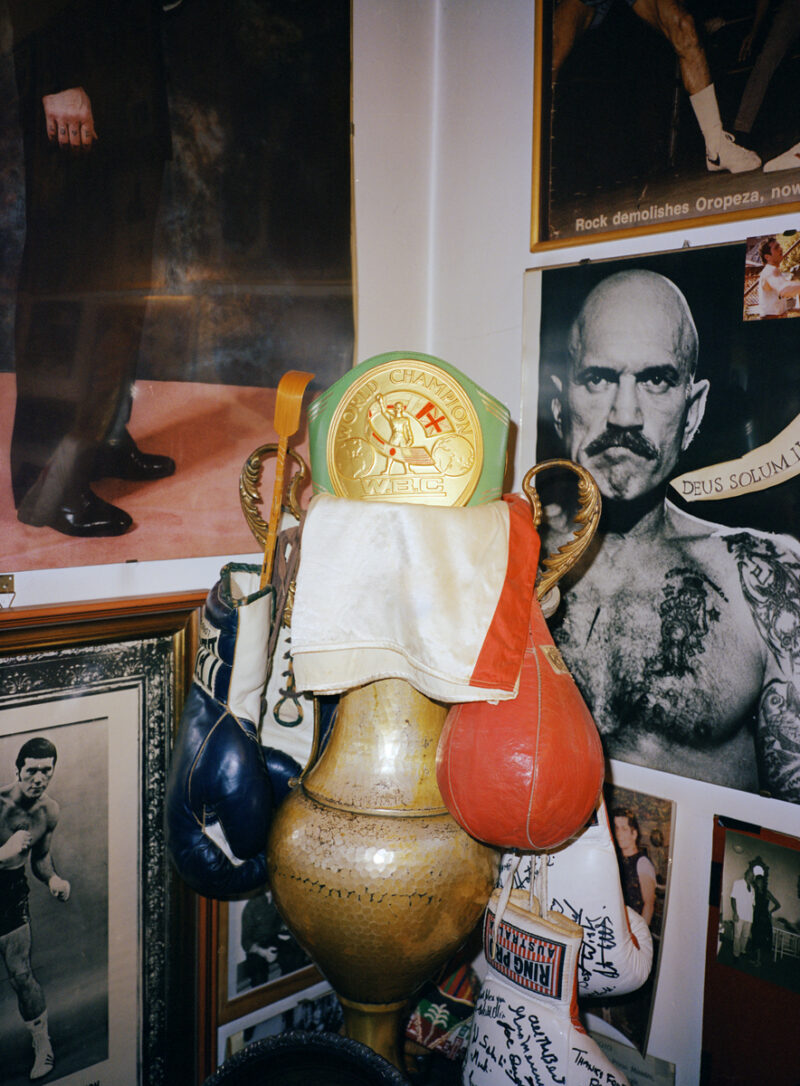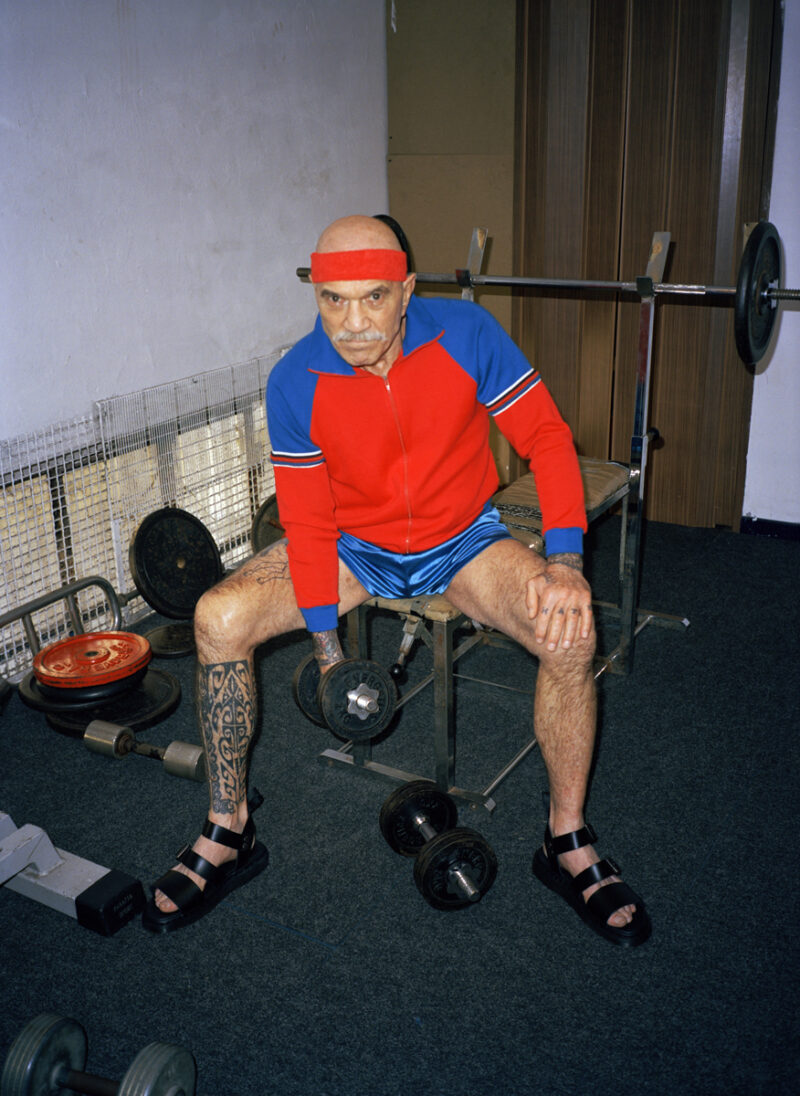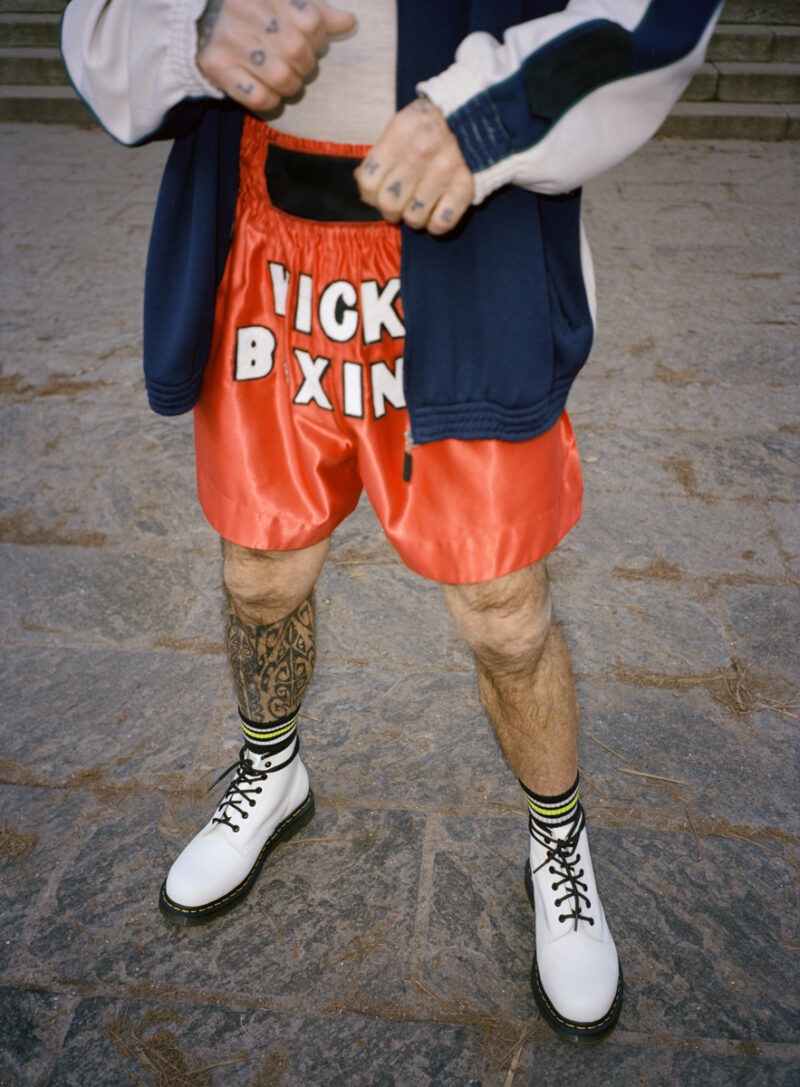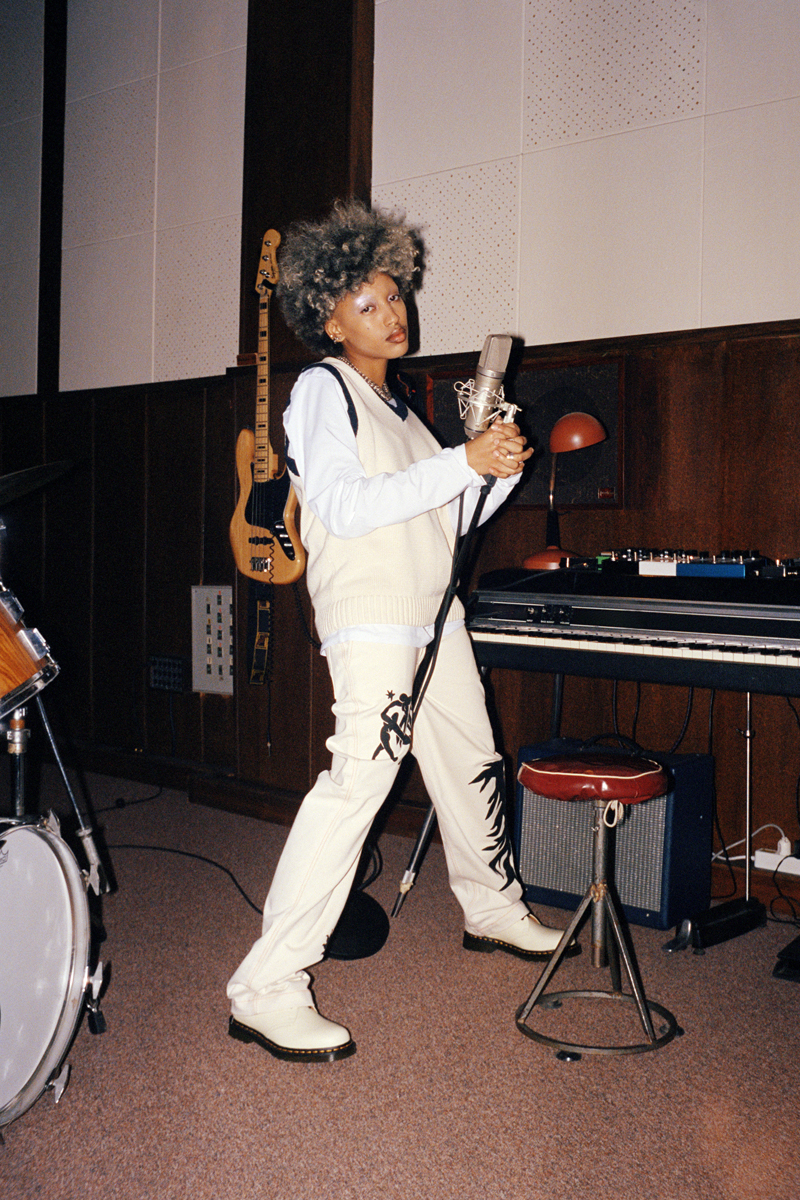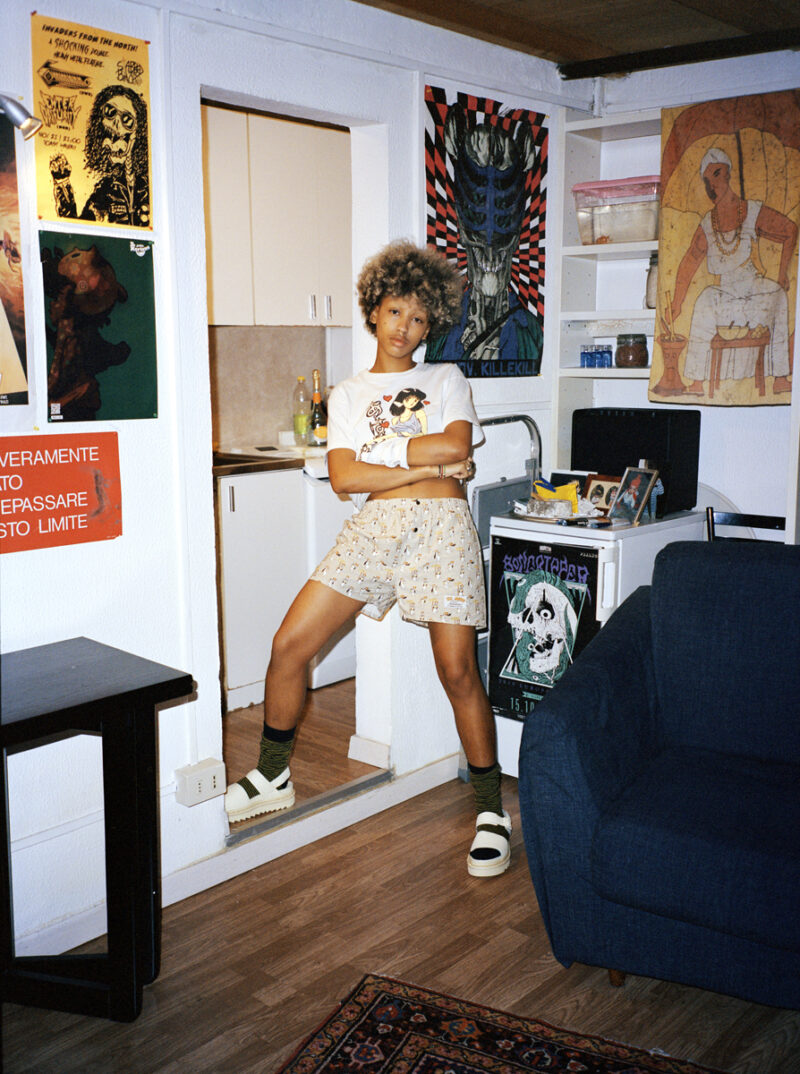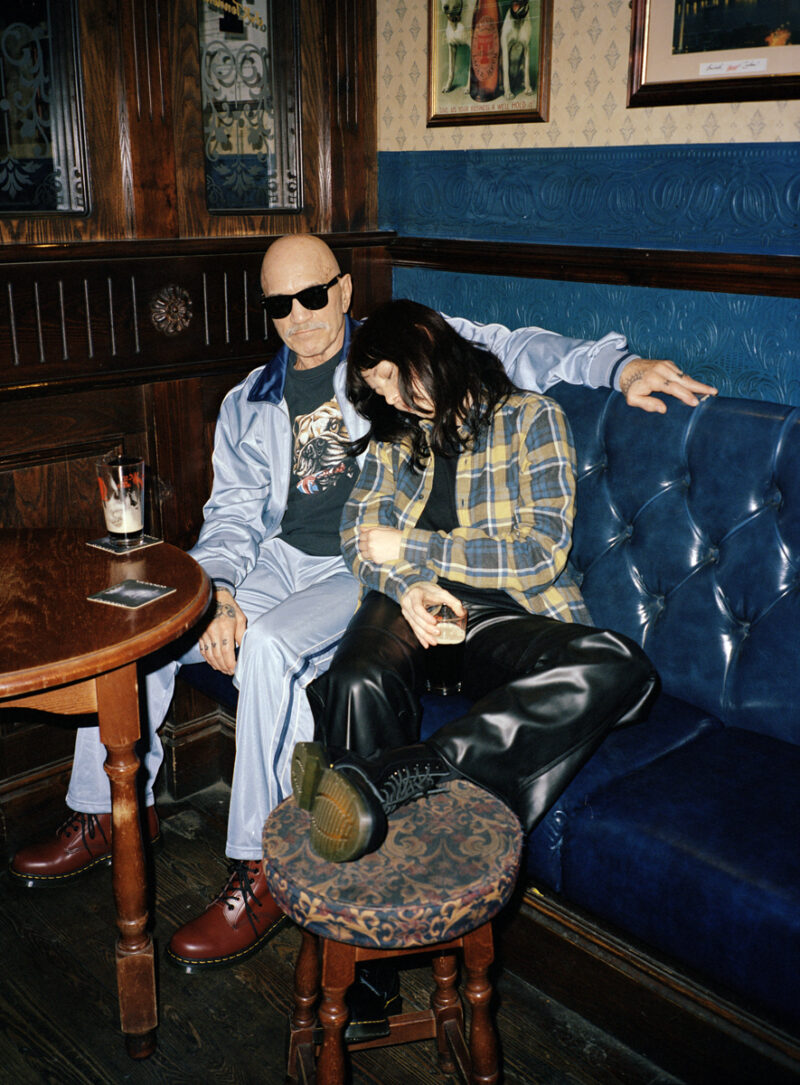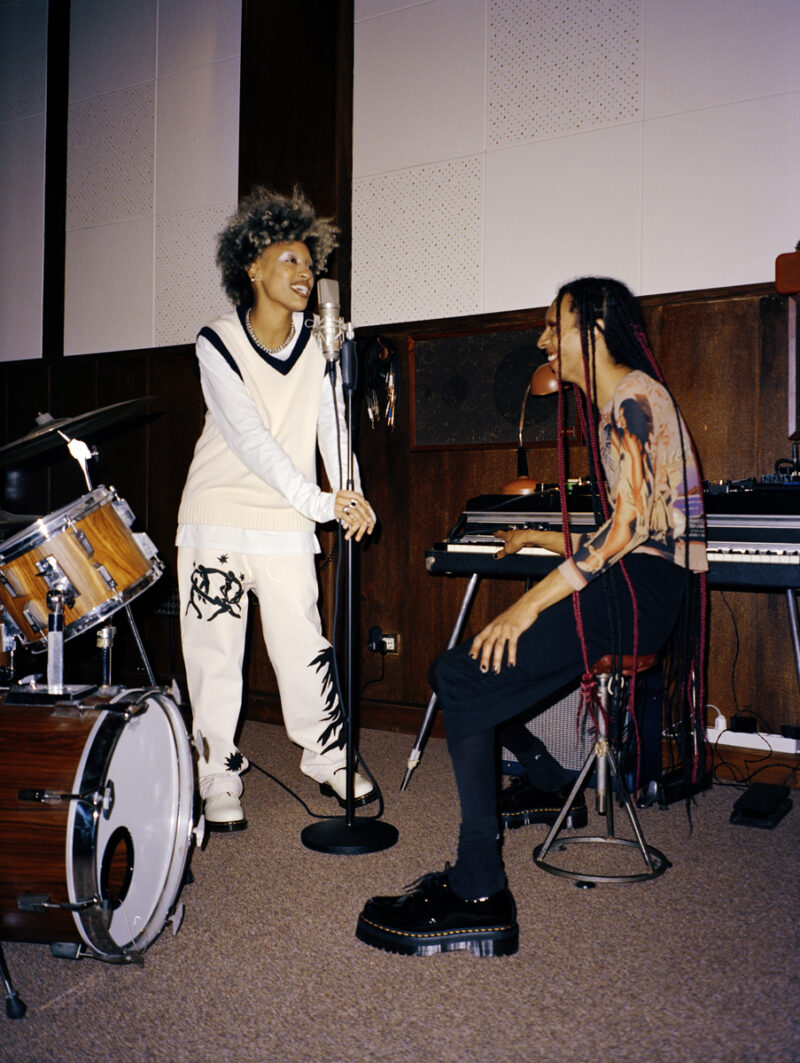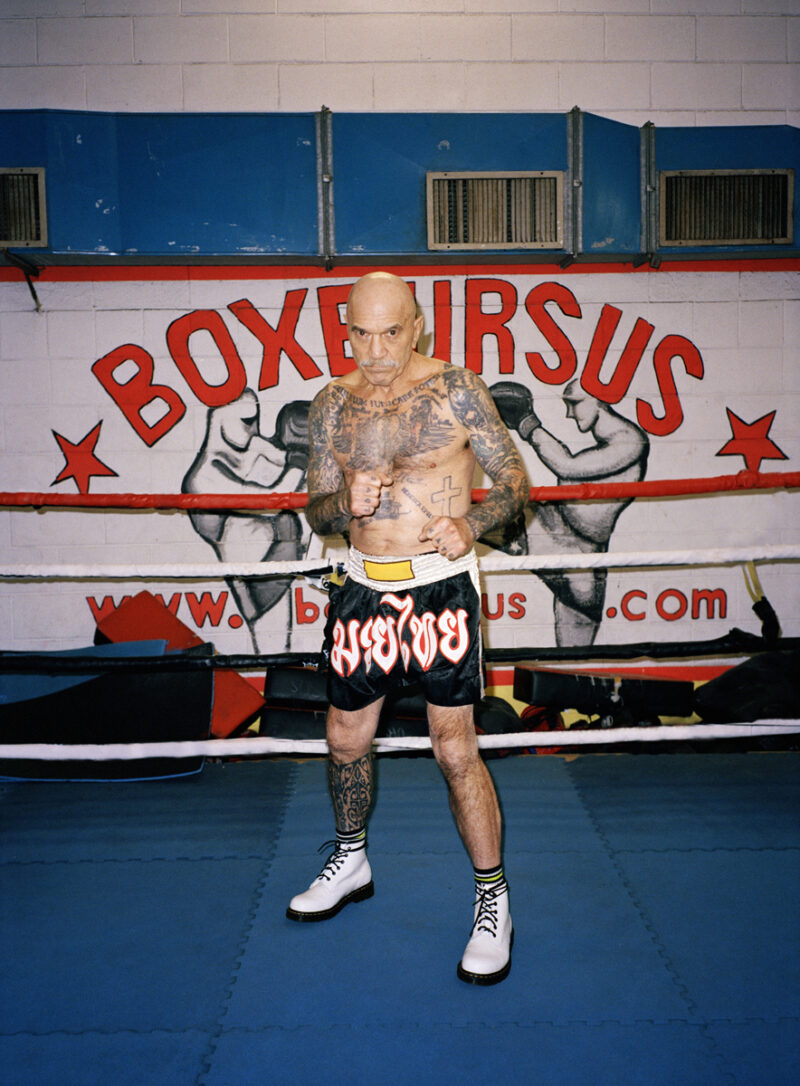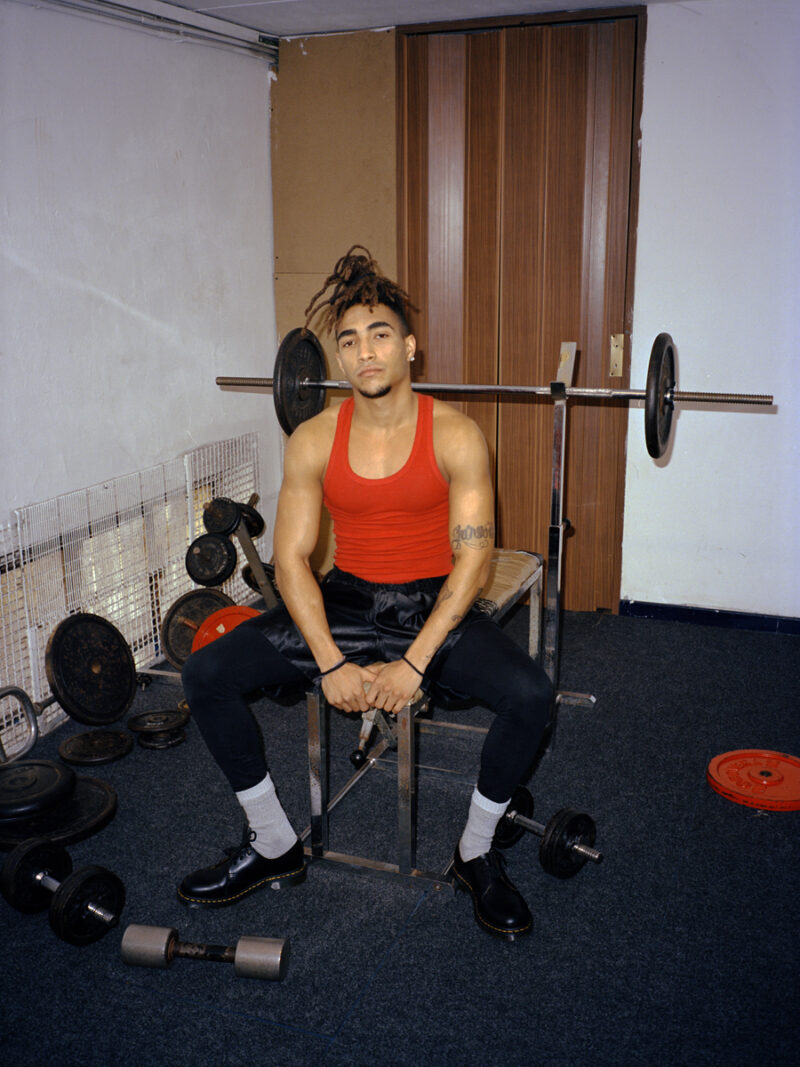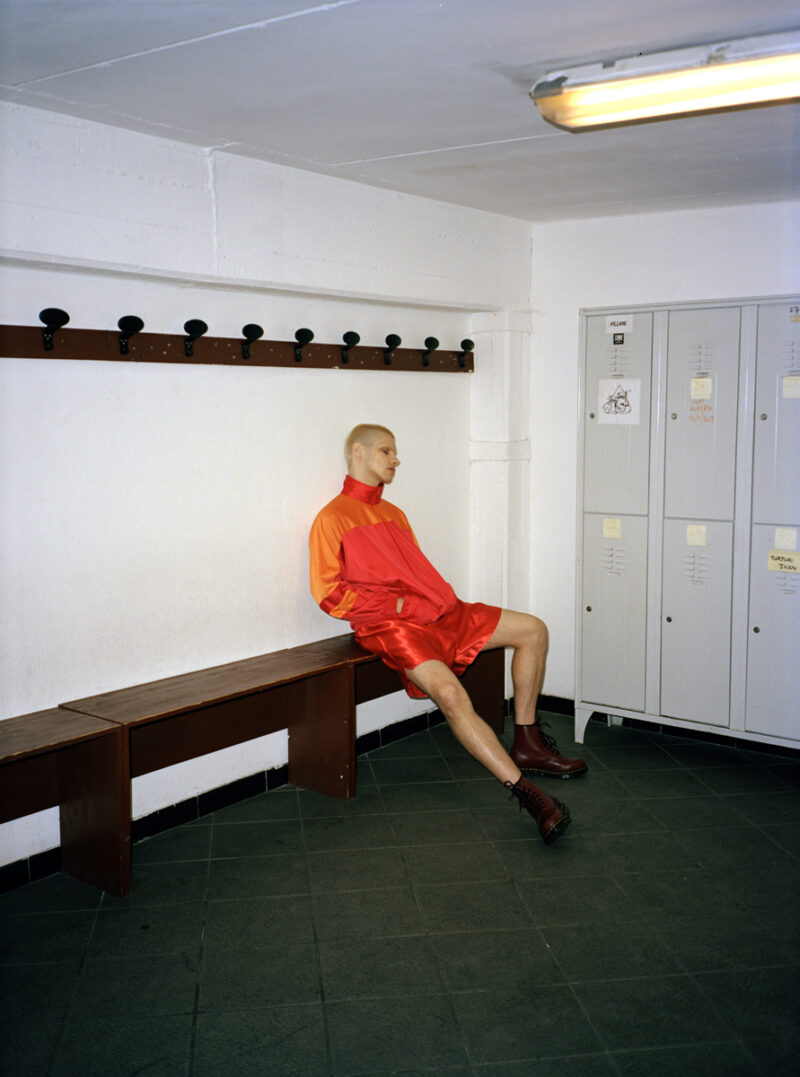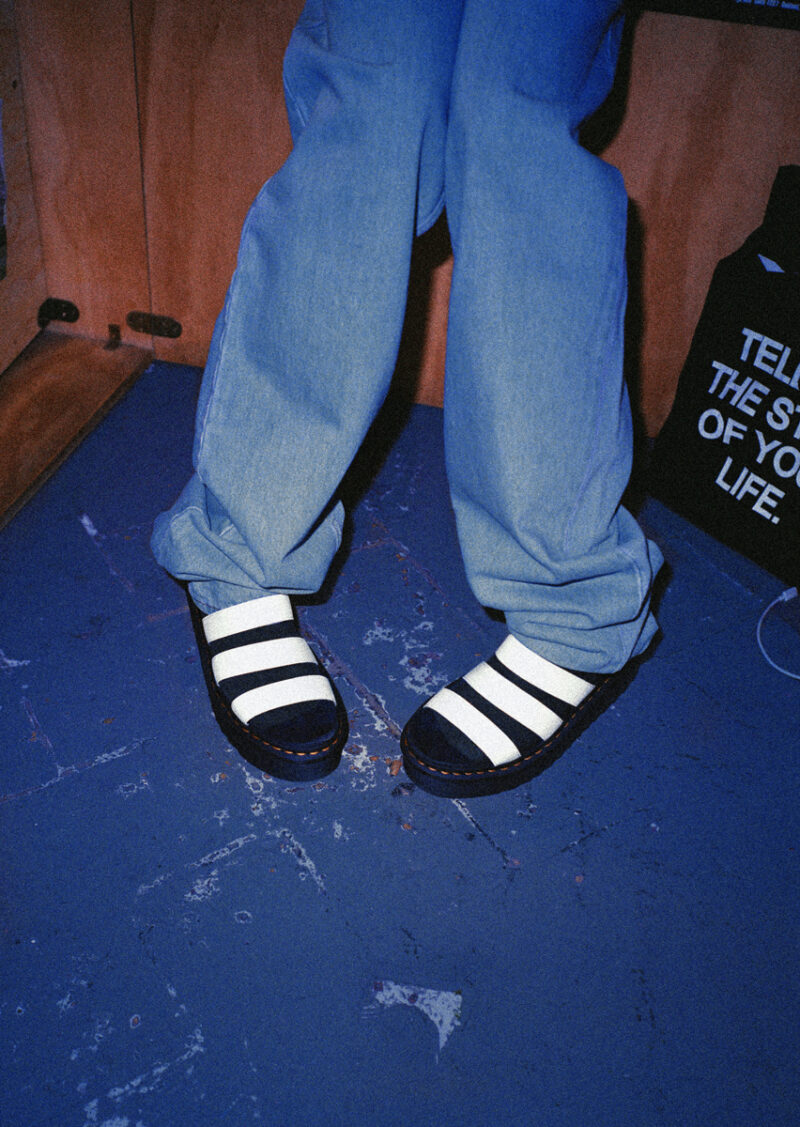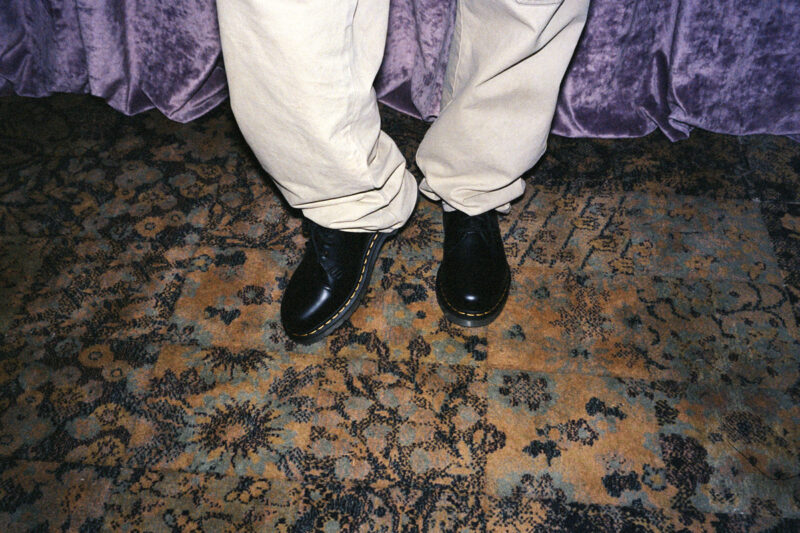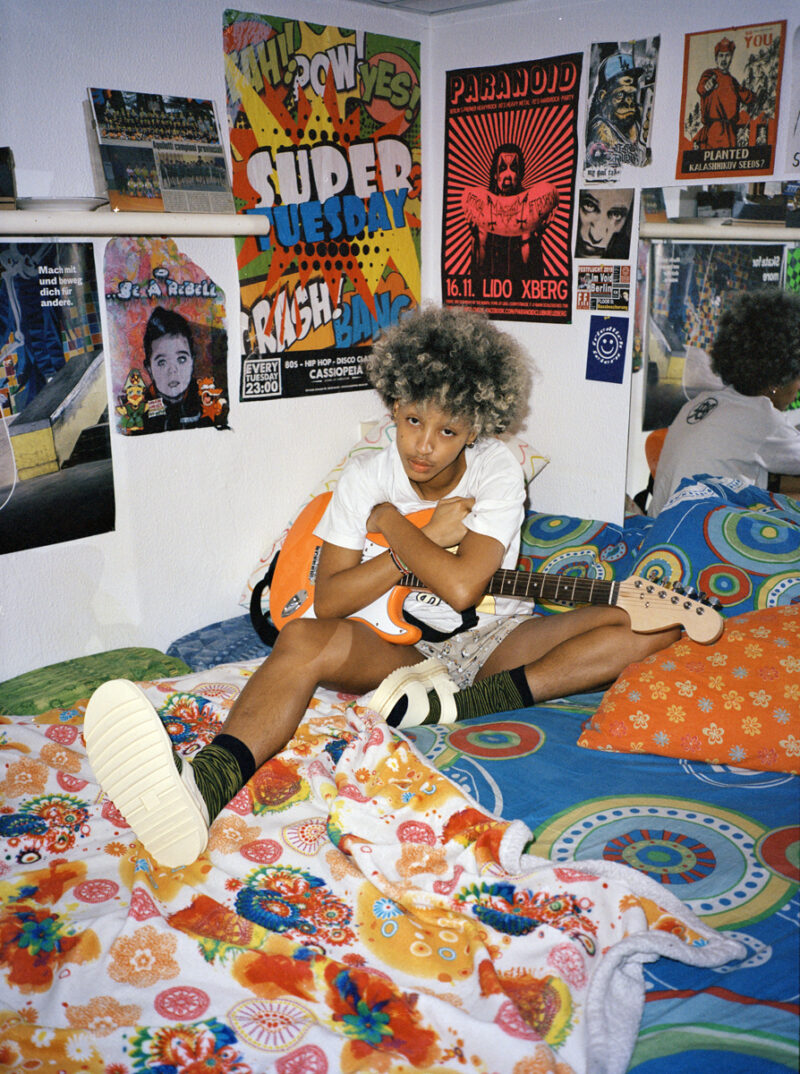Perform to Subvert is a project of C41 Magazine in collaboration with Dr. Martens. It will be featured in C41 Magazine Issue 12, out soon.
Rocky Mattioli is standing like a typical boxer, in a three-quarter stance with high guard. His bare chest is covered in tattoos. Despite his 68 years, he is probably the fittest person in the room, which is what you get from a life spent in training. It’s a cold day and he drops to perform push-ups between one shot and the next. “They keep me warm,” he jokes in his Italo-Australian accent. Today, Mattioli is a personal trainer but 45 years ago, he was WBC world Champion in the junior middleweight category.
Jathson speaks with soft Rs while talking with friends off set, smoothly blending Italian and English. The make-up artist highlights their eyes with golden eyeshadow. Somebody addresses them using female pronouns and they swiftly correct them. They have recently become the first openly non-binary artist to appear on X-Factor. They divide their time between music, fashion and acting, with the utter conviction that they will succeed in them all, blow by blow.
Mattioli landed in Australia as a young Italian immigrant and had to find the personal tools he needed to survive the sinister nationalist mood of the time; his phenomenal career was built on the pillars of training, resilience and sacrifice and he inspired generations of boxers. He fights in the ring of life today just as he did yesterday. Jathson is a young Italo-Kenyan artist developing their personal artistic journey and identity, fighting against the preconceptions that have always plagued those who do not conform to the dominant way of thinking. They are a living breathing example of the infinite importance of individual freedom and identity.
On the one hand, a lifelong fight that has left scars and unforgettable memories and lessons. On the other, the energy of youth, a desire to fight for one’s identity and the passion to take on the future. The ring and the stage. Gloves and mic. Rebellion and subversion. Mattioli and Jathson are two sides of the same coin and both represent and sustain the values promoted by Dr. Martens, which has always stood with generations of rebels fighting against the status quo.
Dr. Martens wanted to explore these two stories further, so different yet not so different after all. We believe that it is through storytelling and sharing experiences that we can open the future to new possibilities and create the culture needed to fight for change. By exploring the experiences of Mattioli and Jathson, fighters in life and performers on stage, Dr. Martens shares two different ways of fighting to express yourself.
MATTIA BARRO: How did you become a boxer? What made you take that direction in life?
ROCKY MATTIOLI: I was living in Australia at the time, where my family had moved in the late 1950s. A cousin of mine arrived from Italy and, like all foreigners, he became a target for the young Australian kids. He didn’t speak English and one day he asked me to accompany him to a gym. He wanted to learn to box so he could defend himself. When we got there, we found this trainer, a former soldier fresh from Vietnam and an alcoholic. I didn’t want to have a go but he made me and when he saw me hit the bag, he told me: “You’re the one who should be boxing, not your cousin.”
MB: I imagine this wasn’t an easy thing to break to your family. How did they react?
RM: My mum and dad were against it from day one. They didn’t want me going around fighting. But when they realised that their rejection was hurting me, they gave in and put their trust in me once more.
MB: What was it like for a young Italian immigrant in Australia back then?
RM: The Australians were extremely nationalist and they didn’t want us Italians there. There were a lot of fights, some very violent. Things were resolved in the street back then. I’ve taken a lot of hits and I’ve given lots too.
MB: Your career brought you back to Italy at a certain point.
RM: Umberto Branchini, one of the most important managers of the time, came to Australia to see me box and he promised me that he would have me fighting for the World Champion title in two years if I came back to Italy. That was in ’75; in ’77 I was World Champion.
MB: Do you miss fighting in the ring? Do you miss the adrenalin?
RM: I really enjoyed boxing even though, naturally, it involved a lot of effort and pain. A lot of pain. I’ve broken ribs, jaw, and an arm in the ring. But you know what? I’d do it all again.
MB: Your relationship with boxing almost feels religious. What does it take to be a boxer? Can anyone be one?
RM: You’re born a boxer. You’ve got to have it in your DNA. If you don’t feel it inside, don’t bother. You can’t get in the ring if you’re scared. You can’t even train with other people if you’re scared, that’s when you really get hurt. The only fear allowed is when you enter the ring before a fight, and everybody is waiting for you and cheering you. But that’s a different kind of fear, it’s a different emotion: it’s a desire to conquer the world.
MB: What did you feel when you entered the ring?
RM: Chills.
MB: As you said, boxing is pain, sacrifice and resilience. What kind of relationship do two boxers have in the ring? What is it that allows you to hit and be hit by another person?
RM: The great thing about boxing, at least back in my days, was the total respect between boxers. You can hit each other, you can provoke each other but in the ring (and out) there has to be reciprocal respect, absolute respect. That’s the most important thing.
MB: Our everyday language often uses boxing as an analogy, drawing parallels between the ring and life. Do you think life is like boxing?
RM: Life is like a ring in that you have to keep fighting, certainly, but boxing means fighting and winning at a certain point. In boxing, it’s all about winning or losing. Life has no winners or losers because it’s not a moment but a constant journey that only stops when you die.
MB: What is the greatest lesson that boxing has taught you?
RM: Suffering. Suffer to move forward in life. When you train and fight, you suffer. It’s like life. Life isn’t easy. Boxing is healthy because it teaches you to live and to respect and understand people.
MB: The sun seems to be setting on the great era of boxing. What do you think has changed since your time?
RM: Boxing is too tough for life today. Running outdoors every morning, in the gym every evening. No drinking or smoking. A boxer’s life is a life of sacrifice and young people today aren’t up for it. That’s why boxing is dying.
MB: You didn’t have all those tattoos when you were fighting.
RM: Both my dad and my manager were against it. I got my first tattoo at the end of my career, two gloves hanging on a hook. As if to say, that’s it, that’s the end.
MB: You’ve said previously that marriage changed your experience in the ring. Was it that you could no longer fight with that total absence of fear that you mentioned earlier? Do you have any regrets?
RM: Life can’t give you everything, there will always be something you have to give up on. Life gave me a marriage and three children but it took boxing from me. I’m proud to say that the first thing I bought with the money I earned from boxing was a house for my wife, where we could raise our children. I’m a personal trainer now, I run my courses and I’ve got my regular clients. I’ve got no regrets, I’ve always upheld my name and my glory. I was World Champion after all.
MATTIA BARRO: You are very young yet you are already moving in multiple different directions: music, fashion and acting. What is your relationship with these arts?
JATHSON: They are all things that I wanted to do, that I feel a part of me, and which are all connected. They are arts that have shaped me personally, determining how I act and perceive the world. I don’t see them as disciplines or activities separate from my day-to-day life. These stimuli are all connections and chain reactions.
MB: Was there a specific moment in your life when you realised that you wanted to dedicate yourself to art?
J: I think I grew up knowing it. From a young age, I always wanted to be the centre of attention; I would climb up onto the table to sing and dance. I grew up knowing who I was and knowing that it was impossible that I wouldn’t achieve what I wanted.
MB: Were there important people along your journey who helped you to fortify this sense of awareness or was it a solitary path?
J: It was fundamental for me to have people who believed and believe in me; it is thanks to them that I am the person I am today. Self-education doesn’t work for me. I think that I’ve been blessed in life with people who have cared for me and, in some way, helped and stimulated me. And now I’ve finally realised the importance of having someone truly teach you something.
MB: Have you ever lost your way within all this confidence?
J: I have a Kanye West complex sometimes where I think I’m the “greatest of all times.” At others, I know that I wouldn’t be what I am without the help of others. It’s an internal conflict. MB J How do you choose the people you collaborate with artistically? I am hyper-selective in both work and life. I have very clear criteria. But when a person fits those criteria, I let them in no problem. I look for authenticity in people, in an organic sense. I look for genius and talent. If you’re not talented, what’s the point? Stay home bro.
MB: What is your relationship with the stage and performance?
J: It’s still an ambiguous relationship, definitely beautiful but it’s still developing. I have come to a couple of realisations recently that have helped me and allowed me to make progress on various issues, making every experience 1,000 times more pleasant and natural. Onstage, I oscillate between feeling at home and feeling under pressure, but I still can’t wait for it.
MB: You took part in the popular national talent show X-Factor. What did you learn from that world?
J: I went on X-Factor to make music but I realised that it’s more about TV than music. As an actor, I respect television, of course, but I like to act when the public knows that I’m acting and there’s a script. I don’t like having to pretend when the public doesn’t know that I’m performing a role because that will ruin my image and come across totally false and inorganic. This manipulation doesn’t work with me; it’s not an environment that I feel comfortable in.
MB: It was an opportunity to represent a community in a space that is normally predominantly hetero-normative. How was the experience from that perspective?
J: I usually refuse projects if they only call me because they need a non-binary person. Naturally, I am happy if people can see themselves in me. Being a non-binary artist on X-Factor meant I received a lot of amazing messages from people who were able to see themselves in what I represent. But I use the non-binary label purely because it’s easier and to explain the reason for my pronouns. It’s not something I live by. I don’t feel part of the mythical non-binary community. I feel 100% human being. It’s a law of the universe that there is masculine energy and feminine energy. I just want to be a complete and whole human free from limits, without having to live by or be accountable to somebody else’s expectations.
MB: Are you worried that this definition might become the filter through which people will see you and your art?
J: Yes, simply because I don’t think I want to be the person who represents the non-binary conversation for their whole career. I want to mention this label as little as possible and just turn it into something increasingly natural. I want to be able to define myself however I want without feeling like an imposter, like there’s something wrong with me or, even worse, like I’m faking it for attention. I know it’s not cool but that’s what gets in your head. It’s complicated, it’s difficult.
MB: Music allows artists to explore various aspects of their personalities. Has it helped you to understand more about who you are and what you want?
J: It goes hand in hand. No one thing evolves without the other, even when there is no obvious connection. My music is a mixture of contamination and different genres that make sense to me and resonate with me. But instead of saying that I make music, I prefer saying that I am the music I make.
MB: And what music are you making at the moment? What music are you right now?
J: It goes hand in hand. No one thing evolves without the other, even when there is no obvious connection. My music is a mixture of contamination and different genres that make sense to me and resonate with me. But instead of saying that I make music, I prefer saying that I am the music I make.
What connects Rocky Mattioli and Jathson spans epochs and social contexts to exist in the eternal present of the struggle for personal self-determination. It is the common thread that—across continents and eras—inexorably binds those who are fighting for change in the present for their own future: the rebels and free thinkers that Dr. Martens stands behind. Mattioli and Jathson powerfully represent these values of authenticity, honesty and social responsibility. And their coming together, whether onstage or in the ring, is the story of two people dedicated to changing their lives, step by step, song by song, one meeting at a time. After all, as Vinicius de Moraes sang: “Life, friend, is the art of encounter.”

